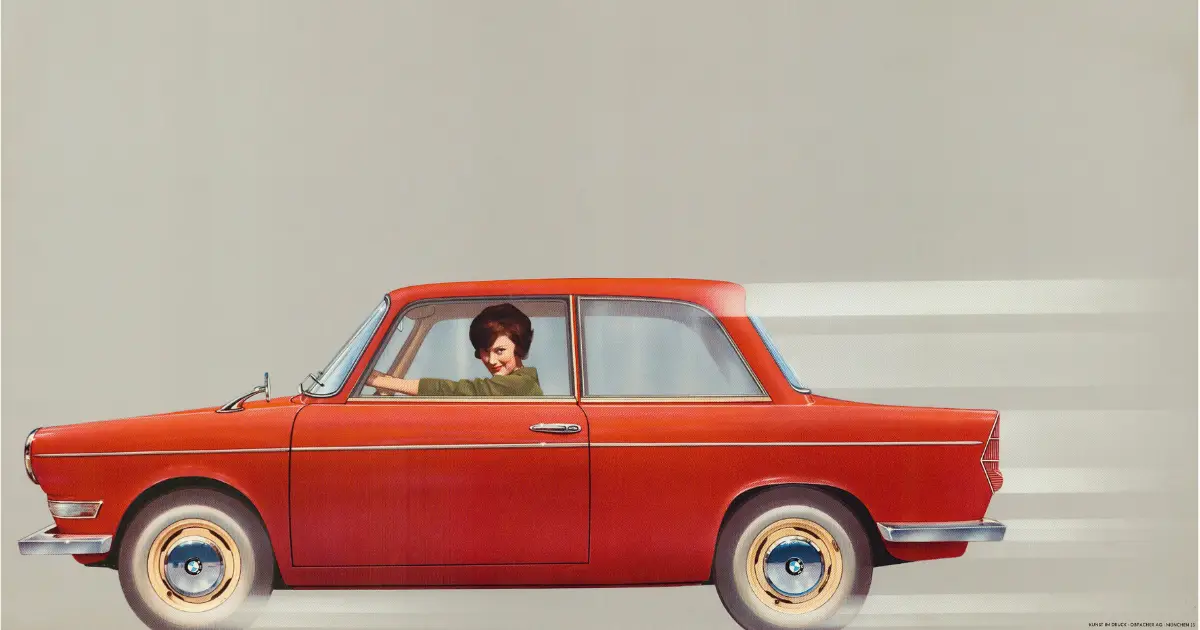.webp)
© History Oasis / Created via Midjourney

1936-early 1940s
This slogan was included in BMW’s pre-war advertising. Drivers would see it on German 1936 billboards for cars and motorcycles. It was the first time BMW used “Freude” (joy/pleasure) in marketing. It was an emotional statement that BMW drivers would connect with the brand.
The slogan accompanied the BMW 326, which promised “doppelte Freude am Fahren” (double driving pleasure).
WW2 temporarily ended consumer production, but consumers would never forget.

1955-late 1950s
This slogan, created specifically for the quirky Isetta microcar, addressed post-war German economic hardships. The egg-shaped, front-door entry Isetta became a symbol of BMW’s rebuilding effort.
While emphasizing affordability, BMW maintained its focus on driving pleasure.
The Isetta helped save BMW financially—bridging both utility and enjoyment.

1950s
This slogan targeted luxury buyers, emphasizing exclusivity and sophistication. The messaging positioned BMW as a status symbol during Germany’s economic recovery.
The company was rebuilding its premium identity after years of producing pots, pans, and bicycles following the war.
This status-oriented approach helped BMW establish itself in the luxury sector.

1960s
This German tagline appeared periodically in press releases during the 1960s.
It was created when BMW was developing its “Neue Klasse” (New Class) of sports sedans that would ultimately save the company from financial collapse.
The slogan suggested BMW’s renewed confidence after near-bankruptcy in 1959 when Mercedes-Benz almost acquired the company before the Quandt family intervention.
%20bmw%20slogan.webp)
1965-1972
Introduced alongside BMW’s Neue Klasse models, this slogan debuted in a 1964 ad for the BMW 1800 before becoming the official tagline in 1965.
As the company found its modern identity, BMW needed an official slogan to shift toward sporty, dynamic vehicles.

1972-present
In 1972, BMW streamlined “Aus Freude am Fahren” to simply “Freude am Fahren” and standardized its English translation as “Sheer Driving Pleasure” internationally.
This revision was used for BMW’s launch of its Motorsport division and the Munich Olympics, which solidified BMW’s engineering reputation.
The slogan has proven remarkably durable, remaining in use for over 50 years in most global markets (except the U.S. and U.K.).

1974-2009, 2012-present
Ad agency Ammirati & Puris created this slogan for the North American market. It debuted alongside BMW’s victory at the 1975 Sebring 12-hour race.
The campaign helped BMW’s U.S. sales from 15,007 cars in 1974 to over 100,000 annually by the mid-1980s.
Martin Puris, the slogan’s creator, predicted it could last “forever” as long as BMW built cars that were true to its performance ethos.
After a brief hiatus during the “Joy” campaign (2009-2012), BMW reinstated this tagline due to its effectiveness.

2009-2012
This short-lived campaign aimed to broaden BMW’s appeal, particularly with women. The campaign highlighted emotional connection alongside performance.
Tied to BMW’s “EfficientDynamics” sustainability initiative, it included sub-slogans like “Joy is EfficientDynamics” and “Joy is BMW.”
The campaign gained prominence during the 2010 Winter Olympics with “Olympic Moments of Joy” segments.
The “Joy” campaign failed to capture BMW’s core identity as effectively as “The Ultimate Driving Machine.”

2011
This campaign-specific slogan was created for the BMW 1 Series F20 launch, highlighting the model’s dual personalities—sporty performance and urban practicality.
Advertising featured sibling pairs with contrasting traits to illustrate this duality.